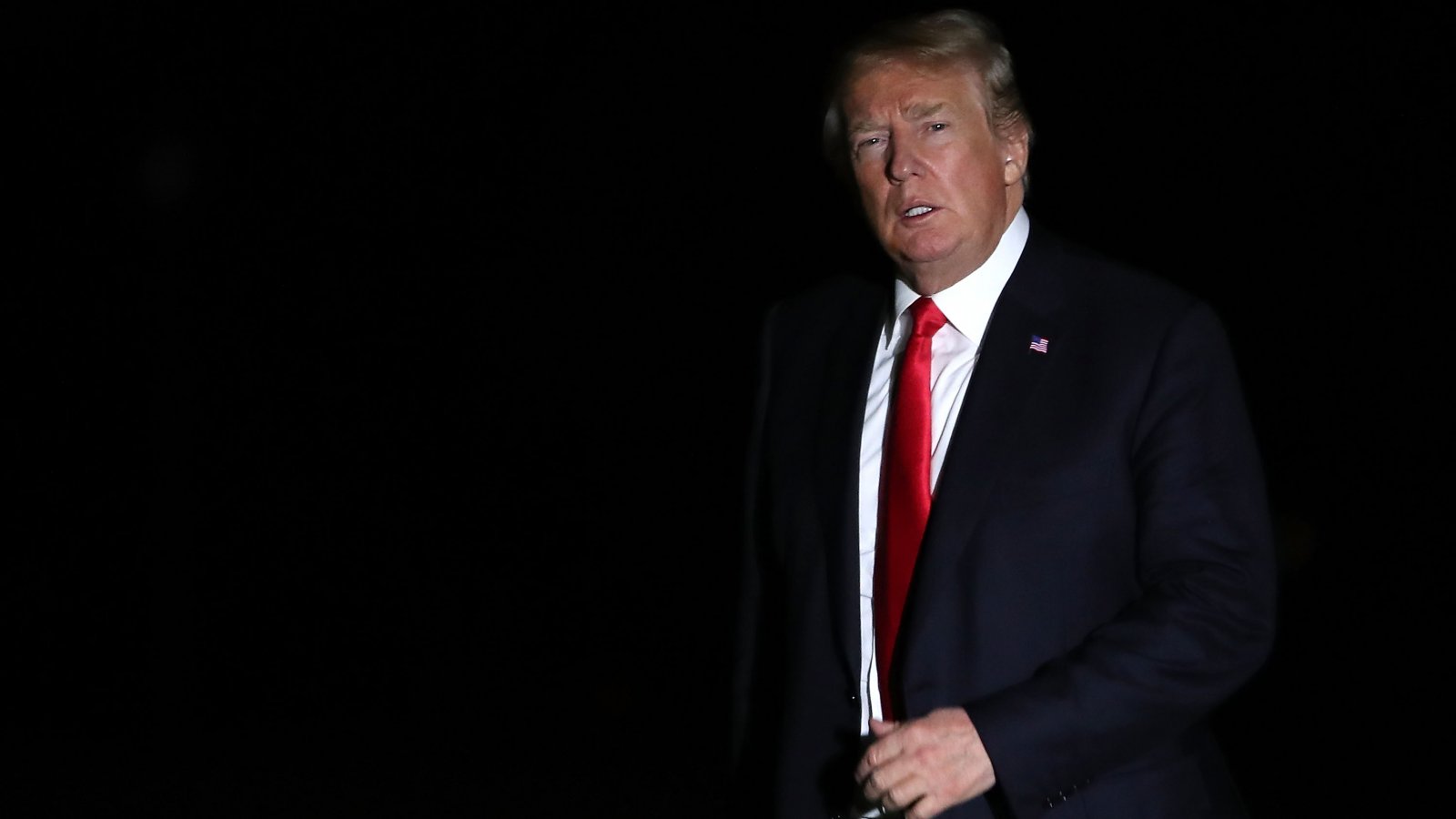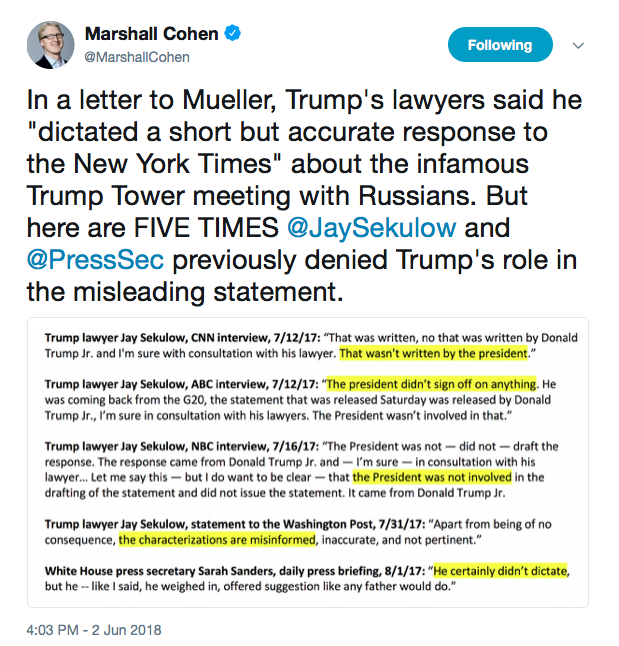
The New York Times has obtained a confidential memo hand delivered in January from two of President Trump's lawyers to Special Counsel Robert Mueller laying out the reasons why they believe the president cannot be forced to testify and why they say is not possible he committed obstruction of justice in the Russia investigation. They also expose previously unknown or contested facts about the inquiry.
First, the 20-page letter signed by attorneys John Dowd and Jay Sekulow says they believe the special counsel does not need anything more than what he already has. They also claim the president cannot possibly obstruct justice because, as the president, he has the right to shut down any investigation, fire any subordinate, or issue any pardon at will.
... [A]ll of the answers to your inquiries are contained in the exhibits and testimony that have already been voluntarily provided to you by the White House and witnesses, all of which clearly show that there was no collusion with Russia, and that no FBI investigation was or even could have been obstructed.
It remains our position that the President’s actions here, by virtue of his position as the chief law enforcement officer, could neither constitutionally nor legally constitute obstruction because that would amount to him obstructing himself, and that he could, if he wished, terminate the inquiry, or even exercise his power to pardon if he so desired.
From the NYT article about the letter:
Because of the authority the Constitution gives him, it is impossible for him to obstruct justice by shutting down a case or firing a subordinate, no matter his motivation, they said.
Second, Dowd and Sekulow assert the Russia investigation is making the president's job more difficult, especially since, in their unsubstantiated opinion, the president's own Department of Justice and FBI are corrupt.
We express again, as we have expressed before, that the Special Counsel’s inquiry has been and remains a considerable burden for the President and his Office, has endangered the safety and security of our country, and has interfered with the President’s ability to both govern domestically and conduct foreign affairs. This encumbrance has been only compounded by the astounding public revelations about the corruption within the FBI and Department of Justice which appears to have led to the alleged Russia collusion investigation and the establishment of the Office of Special Counsel in the first place.
Third, the lawyers claim Mueller should be thankful the president did not use his power of executive privilege more broadly claiming he was allowing the special counsel to see "clearly protected documents" "in the interest of complete transparency."
Fourth, the president does not have time, they say, to sit for a interview or testify before a grand jury. This assertion ignores, of course, the well-known fact that the president spends a tremendous amount of time watching cable news and playing golf.
NYT:
They argued that the president holds a special position in the government and is busy running the country, making it difficult for him to prepare and sit for an interview. They said that because of those demands on Mr. Trump’s time, the special counsel’s office should have to clear a higher bar to get him to talk. Mr. Mueller, the president’s attorneys argued, needs to prove that the president is the only person who can give him the information he seeks and that he has exhausted all other avenues for getting it.
“The president’s prime function as the chief executive ought not be hampered by requests for interview,” they wrote. “Having him testify demeans the office of the president before the world.”
Fifth, by their interpretation of the law, firing FBI Director James Comey after saying he hoped Comey could see to letting the [General Michael] Flynn matter go would not constitute obstruction of justice for two reasons.
... Mr. Trump could not have intentionally impeded the F.B.I.’s investigation, the lawyers wrote, because he did not know Mr. Flynn was under investigation when he spoke to Mr. Comey. Mr. Flynn, they said, twice told senior White House officials in the days before he was fired in February 2017 that he was not under F.B.I. scrutiny.
“There could not possibly have been intent to obstruct an ‘investigation’ that had been neither confirmed nor denied to White House counsel,” the president’s lawyers wrote.
Moreover, F.B.I. investigations do not qualify as the sort of “proceeding” an obstruction-of-justice statute covers, they argued.
(...)
But the lawyers based those arguments on an outdated statute, without mentioning that Congress passed a broader law in 2002 that makes it a crime to obstruct proceedings that have not yet started.
One of the biggest revelations in the letter is an admission, for the first time, that the president did personally dictate the misleading statement about Donald Trump Jr.'s June 9, 2016 Trump Tower meeting with a Russian government lawyer and others.
The lawyers acknowledged that Mr. Trump dictated a statement to The Times about the 2016 Trump Tower meeting between some of his top advisers and Russians who were said to have damaging information about Hillary Clinton. Though the statement is misleading — in it, the president’s eldest son, Donald Trump Jr., said he met with Russians “primarily” to discuss adoption issues — the lawyers call it “short but accurate.”
Mr. Mueller is investigating whether Mr. Trump, by dictating the comment, revealed that he was trying to cover up proof of the campaign’s ties to Russia — evidence that could go to whether he had the same intention when he took other actions.
The president’s lawyers argued that the statement is a matter between the president and The Times — and the president’s White House and legal advisers have said for the past year that misleading journalists is not a crime.
You have received all of the notes, communications and testimony indicating that the President dictated a short but accurate response to the New York Times article on behalf of his son, Donald Trump, Jr. His son then followed up by making a full public disclosure regarding the meeting, including his public testimony that there was nothing to the meeting and certainly no evidence of collusion.
CNN's Marshall Cohen identifies five times Sekulow and the White House said the president did not dictate the letter.
Full story: Trump’s Lawyers, in Confidential Memo, Argue to Head Off a Historic Subpoena (NYT)
Read the annotated letter: The Trump Lawyers’ Confidential Memo to Mueller, Explained (NYT)
